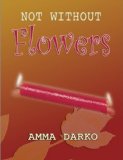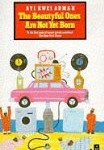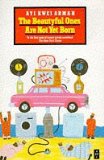Five words from the blurb: women, Africa, dilemmas, confronting, social
Not Without Flowers gives an insight into Ghanaian culture; raising interesting discussions about polygamy, the treatment of mental health and HIV, and the difficulties faced by an ordinary family trying to raise enough money for a decent funeral.
The book begins with a distressing scene in which those with mental health problems are found chained to the floor, having been beaten by witchdoctors attempting to rid their bodies of evil spirits. It then goes on to introduce a man with five wives. He commits suicide after discovering that he has HIV and the family have to deal with the double grief of his death and his diagnosis.
I loved the way the book introduced me to many issues I was unfamiliar with. The emotions associated with polygamy were particularly interesting:
Many wives who suspect their husbands of having extra marital affairs usually pray for one thing, especially when they know they can’t stop him or what is going on. They pray that they never see nor hear nor smell the affair. She had. She had seen her, had heard her and had smelled her at her workplace and in her bedroom. But in this society where polygyny is a norm, how is a wife to receive adequate sympathy and understanding for a pain she must be suffering as a result of a husband’s unfaithfulness? The pain itself, that she is feeling, is doomed and becomes her failure. She is expected not to feel that pain at all. She is supposed to feel lucky enough to be the one wearing his ring, which should enable her to bear his little pleasures.
Unfortunately I found the book disjointed. Individual scenes were fantastic, but the plot jumped around between a large number of people and so it was impossible to bond with any individual. Things improved towards the end, but I would have preferred the story to concentrate on a fewer number of characters.
The book also contained some surrealism that I didn’t understand. Dreams seemed to come true and there were some potent symbols and visions that clearly had meanings I was unaware of. I think a greater knowledge of African mythology would improve enjoyment of this book, but I guess that will come from reading more books like this one.!
I’m pleased that I read Not Without Flowers because it introduced me to many new themes and ideas. It is a perfect choice for Ghanaian Literature Week and I recommend that you head over to Kinna’s blog in order to find out much more about literature from Ghana.

.




